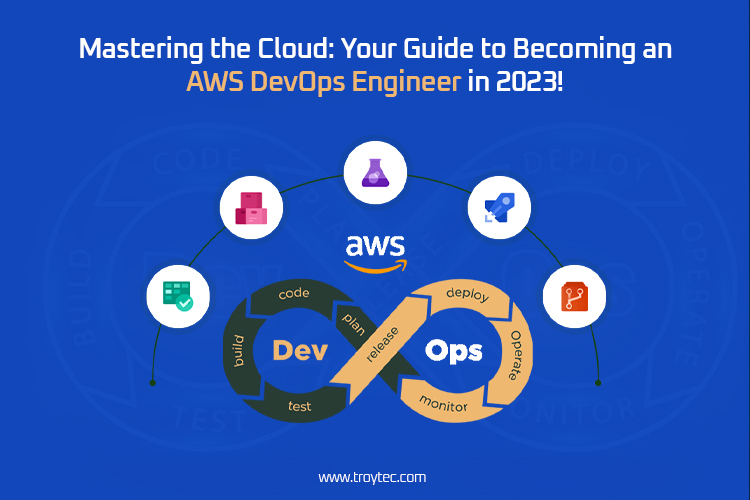Mastering the Cloud: Your Guide to Becoming an AWS DevOps Engineer in 2023!
Cloud computing has flounced the IT industry, and AWS (Amazon Web Services) is the forerunner of this change. AWS has become the go-to stage for enterprises desiring to host their apps and services in the cloud platform due to its varied and highly scalable infrastructure. As a result, there is a growing demand for employees with AWS DevOps skills.
AWS DevOps is a specialist discipline requiring knowledge of AWS infrastructure and DevOps principles. It entails developing, deploying, and controlling highly available, fault-tolerant, and scalable structures on the AWS cloud and automating, collaborating, and delivering continuous delivery.
AWS DevOps engineers must have a unique combination of technical and soft abilities. It would be preeminent if you were well-versed with AWS facilities like EC2, S3, and RDS, as well as Lambda and other computer programmings languages such as Ruby, Ruby on Rails, and Bash. You must also thoroughly understand DevOps approaches such as continuous development, continuous delivery, and architecture as code.
This fantastic blog will examine the skills and expertise needed to cover everything from basic cloud computing ideas to complex AWS services and DevOps concepts. We will discuss crucial issues, including deployment technology, monitoring, scalability, and how to integrate DevOps methods in your firm.
This guide will offer you the expertise and possessions you need to succeed in this fascinating and active area, whether you are a determined DevOps engineer or a veteran IT specialist looking to improve your abilities.
Who is a DevOps Engineer?
A DevOps engineer is an IT practitioner who should be well-versed in developments and operations, such as coding, managing infrastructure, administration of systems, and DevOps toolchains. Because they work across organizational silos to create a more cooperative atmosphere, DevOps engineers must also have excellent interpersonal abilities.
DevOps engineers must determine distinctive system architecture, the provisioning process, and administration. Still, they must also have expertise in traditional developer techniques and instruments, such as using source control, providing and receiving feedback on code, writing unit tests, and being familiar with agile development principles.
What Does a DevOps Engineer Do?
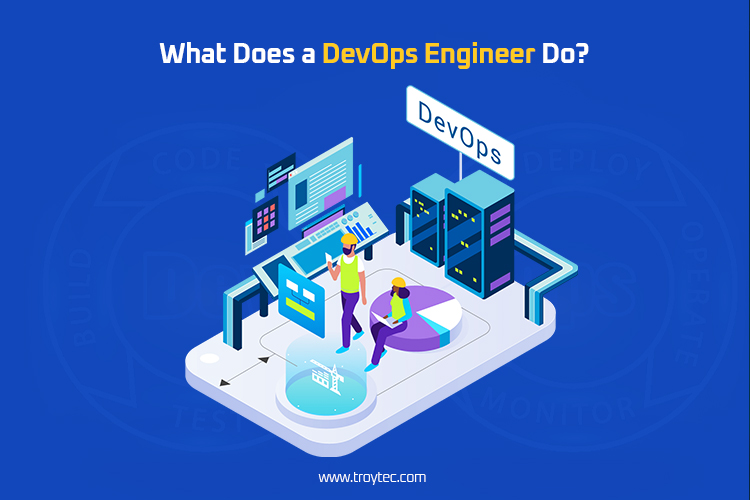
DevOps engineers reduce intricacy by bridging the gap between activities required to alter an application and tasks needed to maintain stability swiftly.
Development and IT operations personnel may have different talents and aims. Developers want to add new features to a program, whereas operations teams want to keep an application stable after deployment.
DevOps is all about process integration and automation, and DevOps engineers play an essential role in merging code, application upkeep, and application administration. These activities require an understanding of not only development life cycles but also DevOps culture, philosophy, techniques, and tools.
Developers, system administrators, and developers might be segregated in an agile setting, collaborating on an identical product but not exchanging information required to assure value to the user.
Some organizations may engage specialists to “perform DevOps” within their processes. Still, because effective DevOps adoption depends on cultural and process reforms, this may only exacerbate the divide between developers & operations personnel.
An AWS DevOps engineer must be familiar with IT infrastructure that supports software code in committed multi-tenant or hybrid cloud settings. They may be required to provision resources, choose an acceptable deployment architecture, direct testing protocols to validate each release, and monitor functionality following the release. Tasks may include preparing test data, analyzing results, debugging problems, and communicating issues to software developers.
The DevOps methodology for software development aims for prevalent gradual modifications to code versions, which necessitates frequent deployment and testing regimes. Although DevOps engineers rarely write code from scratch, they must comprehend the fundamentals of programming languages and be conversant with the building tools used to produce new code or update old code.
Top AWS DevOps Engineer Skills Required in 2023
The technical abilities obligatory of an AWS DevOps engineer will fluctuate based on the team context, technologies, and toolkits used. However, good communication and teamwork abilities are needed. A DevOps engineer must also grasp all of the elements of a delivery pipeline and the benefits and drawbacks of existing technologies and services.
Collaboration and Communication
A DevOps engineer must be able to communicate and cooperate successfully with teams, management, and customers. These so-called “soft skills” are sometimes underestimated and devalued, but DevOps’s efficacy strongly depends on the quality and amount of feedback across the whole value chain.
Administration of the System
A DevOps engineer will be familiar with system administration tasks such as server provisioning and management, database deployment, security monitoring, system patching, and overseeing inside and outside network connectivity.
Knowledge of DevOps Tools
Because using the proper tools is critical to DevOps techniques, the DevOps engineer has to comprehend and be able to use a wide range of tools. These technologies cover the entire DevOps lifecycle, from development and infrastructure to monitoring and running a product or service.
Configuration Administration
DevOps engineers are frequently expected to know about at least one management of configurations technology, including Chef, Puppet, or Ansible. Many organizations have used these or similar solutions for automating system administration chores such as system deployment and security patching on existing systems.
Containers and Orchestration of Containers
The code for the software and its runtime atmosphere are combined in the same image using containerization, a Docker-popularized technology. As a result, traditional configuration management solutions are no longer required. On the other hand, managing containers has its own set of issues and knowledge, with the class of tools known as “container executors” (e.g., Docker Swarm or Kubernetes) becoming a required skill for the AWS DevOps engineer.
Continuous Deployment and Continuous Integration
Continuously integrating and continual delivery (CI/CD) are essential techniques of the DevOps approach to developing software and are made possible by various tools. Any CI/CD tool or group of tools’ primary function is to automate software development, testing, and publishing.
DevOps engineers typically have experience configuring and installing one or more CI/CD solutions. They must collaborate extensively with the rest of the software development team to ensure these resources are used efficiently.
System structure and configuration
A DevOps engineer must be proficient in designing, provisioning, and handling computer atmospheres on-premise or in the public cloud. It is critical to comprehend Infrastructural as Code (IaC), an IT management strategy that applies DevOps software development best practices to the administration of cloud infrastructure capabilities. A DevOps engineer should be familiar with AWS, Amazon Web Services, AWS Cloud Formation, and Terraform for modeling IT systems in the cloud.
Knowledge of coding and scripting
Many experienced system administrators have used shell scripts to automate tedious operations. A DevOps engineer should comprehend sophisticated software development processes and how to deploy agile techniques for development, such as code audits and source control.
Collaborative Management Skills
Regardless of the organizational framework, cross-team communication is critical to a good DevOps strategy. Whether the engineering team is divided solely by roles or there have different sections for product development, assurance of quality, DevOps, and so on, the AWS DevOps engineer should operate across the organization as a coach and coworker with a diverse collection of people.
For instance, one of the most beneficial returns on a DevOps investment is the ability to provide developers with speedier feedback. A DevOps engineer must frequently collaborate with QA (whether human testers or developers who create test automation) to increase testing procedures’ speed, effectiveness, and output. You can get different AWS DevOps engineer jobs after getting these skills.
Simultaneously, when trying to optimize the process of generating and deploying code for the application, developers may require assistance from DevOps engineers.
Why Become an AWS DevOps Engineer in 2023?
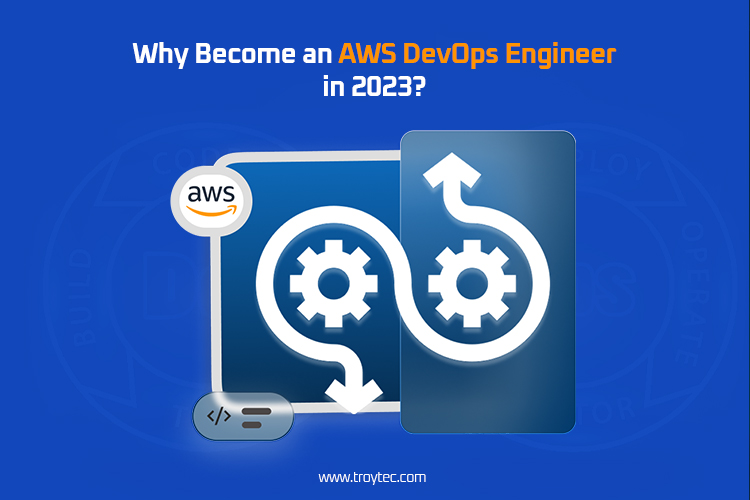
If you’re considering a career in IT, becoming an AWS DevOps engineer is an excellent option in 2023. This specialist sector has numerous advantages, including high demand, rich incomes, and exciting growth and innovation opportunities.
For starters, there will be a high demand for AWS engineers in 2023. As more businesses move their amenities to the cloud, the necessity for competent people to design, build, and maintain cloud substructure grows. This high demand translates into good job security and stability for AWS DevOps engineering professionals.
Second, AWS DevOps can earn a lot of money. According to existing research, the average annual salary for AWS engineers is roughly $119,000, with top breadwinners earning well over $200,000. This pay level is significantly higher than the average for the nation for all IT professions, making it an appealing career choice for many people.
Finally, an AWS DevOps engineer is a career with numerous prospects for growth and innovation. With new Amazon Web Services (AWS) and DevOps tools introduced regularly, experts always have room to learn and build new abilities. This opens up several chances for personal and professional development and the opportunity to participate in cutting-edge cloud technology.
Overall, being an AWS DevOps engineer in 2023 is a wise decision for people seeking a demanding and fulfilling career in IT. It’s a field that offers a variety of rewards for talented workers, with strong demand, excellent salaries, and prospects for growth and innovation.
Best AWS DevOps Engineer Courses in 2023
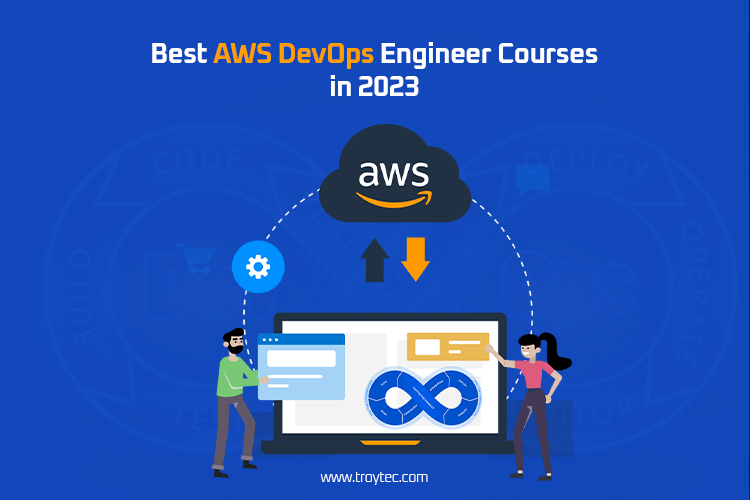
Here we will discuss the best AWS DevOps engineer course, which will also boost the AWS DevOps engineer’s salary.
Become an AWS DevOps Engineer – Udacity
This Nanodegree curriculum will teach you the principles of cloud computing while introducing you to processing capacity, safety, storage, networking, communication, and cloud management services.
Then, leveraging Cloud Formation, AWS’ Architecture as a Script tool, you will discover how to deploy the fundamental infrastructure elements that offer security and amenities to our servers by creating scripts.
As you study Continuous Integration (CI) and continual deployment in this Nanodegree, you will obtain critical knowledge and put it into practice.
Finally, you’ll learn how to shape and launch a Kubernetes band, set up Kubernetes auto scale, and achieve load tests on a Kepler application. It is the perfect AWS DevOps Engineer course for 2023. After taking this course, you will get different AWS DevOps engineer jobs per your expertise.
Those with moderate JavaScript expertise and experience with object-oriented programming, developing websites using HTML and CSS, and working with the Linux command line.
DevOps on AWS Specialization by Coursera
This specialization course will teach you how to design and deploy while keeping applications within the AWS Cloud using a combination of DevOps principles, methods, and tools.
Step by step, you will construct a highly accessible, scalable, cost-effective program during the first course. The first course is a basic-level course that will help you develop your competence, assurance, and credibility by providing you with practical cloud-related abilities that will allow you to innovate and progress your professional future.
In the second session, you will concentrate on the code, build, and test phases of the workflow and learn about subjects such as control of sources, best practices for Continuous integration, and how to utilize the correct tools to gauge code quality by recognizing workflow stages that can be automated.
The following two courses will teach you how to enhance the deployment procedure using DevOps principles and tools that may make deployment more straightforward, such as Infrastructures as Code (IaC) and Amazon Web Services CodeDeploy.
Finally, you will learn how to govern the architecture using AWS DevOps Services to achieve better operating conditions.
AWS Certified DevOps Engineer Professional – Udemy
This hands-on training will serve you with the expertise you require to comprehend, evaluate, and solve the problems on the AWS Certified DevOps Engineer Specialist exam.
In addition, this course thoroughly covers all of the new subjects on the AWS DevOps Professional DOP-C01 test. It is jam-packed with practical expertise on how to leverage AWS as a DevOps inside and out. A Certificate of Completion will be delivered to you. You will also have lifetime access to the duration material. Those have a minimum of an associate certification, such as AWS DevOps Certified.
Become an AWS DevOps Cloud Architect – Udacity
Udacity offers this Nano-Degree Course. This session will explain how to plan, develop, and operate protected cloud infrastructure at scale on AWS.
This program begins with designing and constructing high-availability infrastructures and progresses to making scalable, secure, and cost-effective architecture. This Nano-Degree AWS DevOps Engineer Course Program consists of three courses.
You will have the opportunity to work on real-world assignments alongside industry experts. A technical mentor will assist you.
You will also receive personal coaching and career services, interview arrangements, resume solutions, GitHub evaluation, and LinkedIn profile evaluation.
AWS DevOps Beginner to Advance – Udemy
This course will teach you the basics of the command line as well as hands-on examples of various tools and expertise. You will also learn about Linux, AWS, Bash and Python programming, Jenkins, the Ansible framework Docker, the container orchestration system Cloudformation, Terraform, and other technologies.
You will also learn how various technologies interact in DevOps. You will also have an in-depth knowledge of DevOps Procedures, Tools, and Techniques. A Declaration of Completion will be issued to you. You will also have permanent access to all the course material. It is the best AWS DevOps engineer course you can get in 2023.
AWS DevOps Fundamentals Specialization – Coursera
Coursera offers this as a Specialization Program. This specialty program will teach you the fundamentals of AWS, such as Regions, Reliability Zones, and Virtualized Private Clouds (VPCs).
This level of expertise offers an overview of Amazon Web Services (AWS) characteristics, advantages, and capabilities. You will also discover fundamental security principles such as “the smallest privilege” and the “Shared Accountability Model.”
You will also have the opportunity to put what you have learned into practice by undertaking labs and activities designed by AWS technical educators. This area of expertise program consists of four courses. Upon completion, you will receive a Shareable Certificate and Course Certificates.
You will also receive Course Videos and Readings, Practice Tests, Graded Projects with Peer Feedback, and Graded Quizzes.
What is an Average AWS DevOps Engineer Salary?
AWS DevOps engineering is highly specialized and in demand, with pay varying wildly depending on experience, region, and industry criteria. According to recent salary surveys, an AWS DevOps engineer’s yearly income in the United States (US) ranges from $100,100 to $150,000, with some experts making significantly more. AWS DevOps engineers’ pay is also more lucrative in tech hotspots like San Francisco and New York City and in areas like banking and healthcare. Professionals with advanced abilities in AWS services and DevOps approaches may also fetch better pay.
What Jobs Can You Get After Getting an AWS DevOps Engineer Certification?
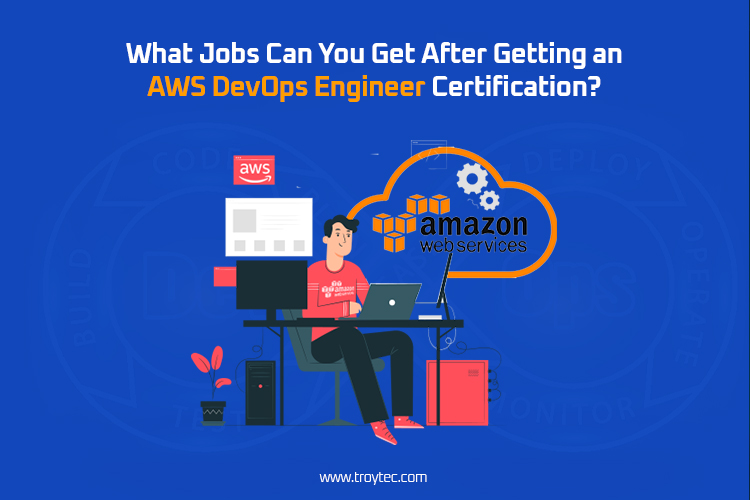
After earning an AWS Development Operations Engineer certification, you can apply for various jobs. All options are working as a DevOps engineer, Cloud designer, Solutions architect, or DevOps expert. DevOps engineers oversee process automation, establish continuous development and delivery, and handle cloud infrastructure. Cloud architects create and manage cloud-based systems, whereas solutions architects create and deploy IT solutions that fulfill business requirements. DevOps consultants assist firms in deploying DevOps processes and achieving their business goals. You may expect to work with cutting-edge technology and substantially influence the IT sector if you have an AWS DevOps certification.
Conclusion
To summarize, being an AWS developer operations engineer in 2023 will necessitate a combination of technical and soft talents, as well as an in-depth knowledge of the infrastructure of AWS and DevOps principles. As the need for cloud computing solutions cultivates, AWS DevOps engineers are crucial in modern IT teams, supporting enterprises in designing, deploying, and handling highly scalable, fault-tolerant, and secure cloud systems.
You may position yourself as an invaluable asset to any corporation wishing to exploit the power of AWS cloud computing by acquiring the skills and information presented in this guide. You will be armed with the tools you need to succeed in this dynamic and lucrative sector, from installing and managing apps to automating deployment pipelines, monitoring, and scaling.
If you want to be an AWS DevOps Engineer, we endorse ongoing your education by studying progressive topics and achieving real-world experience. You can succeed and prosper as an AWS DevOps Engineer in 2023 and beyond if you put in the effort, work hard, and have a strong desire to learn.
